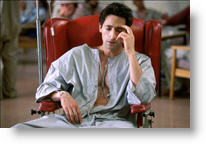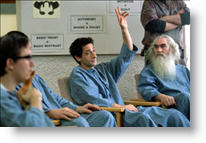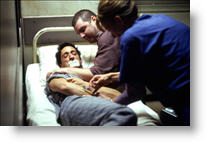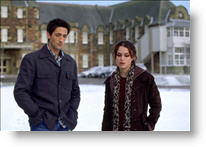The Jacket
 for violence, language and brief sexuality/nudity.
for violence, language and brief sexuality/nudity.
Reviewed by: Michael Karounos
CONTRIBUTOR
| Moral Rating: | Offensive |
| Moviemaking Quality: |
|
| Primary Audience: | Adults |
| Genre: | Crime Thriller Romance |
| Length: | 1 hr. 42 min. |
| Year of Release: | 2005 |
| USA Release: |







See our daily Prayer Focus (in top right column of our home page)
The Disconnect Between Hollywood and America (article)
What is being done to change the values of Hollywood? Answer
Hollywood and God (article)
| Featuring |
|---|
| Adrien Brody, Keira Knightley, Kris Kristofferson, Jennifer Jason Leigh, Kelly Lynch |
| Director |
|
John Maybury |
| Producer |
| George Clooney, Marc Frydman, Peter Guber, Steven Soderbergh |
| Distributor |
“Terror has a new name.”
“The Jacket” is three movies in one that has confused, it seems, all of the critics. They either hate it or like it, but none pretend to understand it. The reason they don’t understand it is because they’re trying to make logical sense of what is really a polemical film. [polemicist: a writer who argues in opposition to others (especially in theology) / polemic: a controversial argument, especially one refuting or attacking a specific doctrine]
Jack Starks (Adrien Brody) is a veteran of Gulf War I (polemic #1), who survives being shot in the head by a victimized Iraqi child (polemic #1a)—who appears to be suffering a seizure. Jack enters therapy, is released, and ends up hitchhiking in rural Vermont where, like a Good Samaritan, he fixes the car of Jean, the drunken mother of a seven year old girl named Jackie. Jack, Jean, and Jackie then share some screen time as Jean throws up and Jack gives Jackie his dogtags.
Proving that no good deed goes unpunished, Jean takes Jackie and leaves Jack stranded in the bitter cold. Jack is subsequently picked up by a drunken low-life with a Southern accent (polemic #2) who kills a police officer. Starks is accidentally shot, passes out, and is declared criminally insane for the police officer’s murder even though the audience knows it was the Southerner who did it. This is clearly unfair.
Not surprisingly, Starks is committed to an abusive insane asylum where a pill-popping drunk Dr. Becker (Kris Kristofferson), competes for screen-time with excruciating close-ups of his own moving denture work. (Think Clutch Cargo but with dentals.) The good doctor’s therapeutic technique consists of drugging Starks, strapping him with the cruciform belts of a straight-jacket, and then filing him in a drawer of the asylum basement’s morgue.
Naturally, Starks freaks out in his metaphysical filing box, but then something strangely wonderful happens; he projects his astral body, his physical spirit, his Other Self forward into time where he’s picked up by a drunk Jackie Price (Keira Knightley).
As the fourth drunk to make an appearance in the film, Knightley has to work harder at being a convincing drunk, and she succeeds under the audience’s suspicion that she really is drunk. When she declares, “I hate Christmas” (polemic #3a—the first in a series anti-Christian sentiments). Apparently, the audience is meant to feel sorry for her because, well, Christmas is unfair, and no wonder she gets drunk.
Meanwhile, befitting a movie with so much alcohol and drugs, director John Maybury films entire sequences in Brody’s eyeballs, in Kristofferson’s mouth, between Kristofferson’s wrinkly, beady eyes and, to a lesser extent, inside of Brody’s capacious nostrils. (Why we never descend into Knightley’s eyes, mouth, or ears is one of the film’s unexplained mysteries.) Oddly, for a film fond of showing children in seizures, the movie itself could potentially induce a few in the audience because of the repeated montages of fast-flashing lights and colors.
Anyway, as Jack is slid into his metaphysical hole, Dr. Becker says (polemic #3b), “I’ll say a prayer for you, Jack. Maybe God will pick-up where the medicine leaves off”—an implicit condemnation of a Christian worldview. The false prayer is followed by gratuitous scenes of a grown-up Jackie (Knightley) naked in the bathtub and, later, naked in Starks’s arms.
These nude scenes are consonant with the pedophilic theme of movies such as “Birth” and “The Woodsman.” Pedophilia is the next taboo that some in Hollywood seem to wish to topple. In Nicole Kidman’s recent film, “Birth,” she shared a bed and bathed naked with a young boy whom she believes to be the reincarnation of her dead husband. These plot devices seem intended to make audiences comfortable with the image of adults and children together in intimate situations.
Starks convinces Price (proof that she’s crazy. too) that he’s actually time-traveling to a point 14 years in the future, and together they go to Becker’s house. Starks knocks, no one answers, and they learn from a nosy neighbor that he’s not home. At this point, the audience may wonder why it had to waste time driving in the snow to learn that useless information. The reason is because, Becker, alias The Religious Hypocrite (polemic #3c), is attending a church whose entrance looks strangely like one of the shots of the-can you guess?-yep, the insane asylum. Starks confronts him by saying (polemic #3d), “How’s that work, huh? God doesn’t remember?”
The movie seems to portray the Gulf War, America’s Southerners, and a church-going “Christian” as Evil. What is the movie really saying? The jacket, like Karl Marx’s “opiate of the people,” is a metaphor for “conservative/Christian belief.” The movie presents the assertions by Dr. Becker that Starks is delusional as a ridiculous proposition and implies that it is the pill-popping, Scotch-swilling, Christian doctor who is delusional.
Consequently, it seems the audience is supposed to reject everything associated with Dr. Becker (except alcohol), since his faith and therapeutic practice are equally culpable for his criminal behavior.
The one theme the movie has in common with Christianity is resurrection. The jittery Iraqi boy in the beginning (who shoots Starks) is duplicated in the end by, surprise, another Middle-Eastern boy who coincidentally also suffers from seizures. The good Dr. Lorensen (Janet Jason Leigh) gives the boy electro-shock therapy and restores him to his right mind.
Similarly, a good bump on the head restores Jack Starks to his right mind and enables him to be resurrected. He escapes the filing drawer, which he calls a “womb,” and is born again into a bright future with a happy Knightley who has given up alcohol and her gas-guzzling SUV. She now drinks latte and drives a Volkswagen Beetle (I kid you not). Now, is that a liberal fairy tale for our time or what?
In an age when an American President, publicly professing his faith in Jesus Christ, has freed approximately 55 million people in Afghanistan and Iraq from the dual tyrannies of Islamo-fascism and Baathism, many in Hollywood continue to make movies which attack our nation’s army, its founding Christian faith, and its “red-state” (Republican) citizenry, many of whom have a Southern accent. It seems that many in Hollywood hate Christians, but Christians can respond by showing their love for Hollywood. Pray for their directors with sincerity—and spend your money elsewhere to demonstrate that we won’t purchase their sex-and-drug-addled delusions at any price.
[See our daily Prayer Focus which lists a different set of media leaders to pray for each day—located on our Christian Spotlight home page.]
You may escape “The Jacket” by not seeing it. The filming is too often nauseating, the writing pretentious, and the polemics sophomoric.
Violence: Moderate / Profanity: Moderate / Sex/Nudity: Heavy
See list of Relevant Issues—questions-and-answers.


Average/4

My Ratings: Average/4